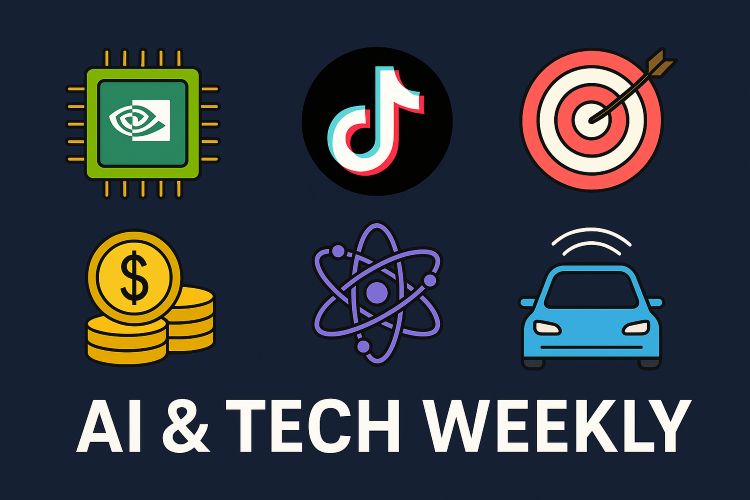AI Navigation
- articleAI Trends
- lightbulb_2AI Tips
- assistant_navigationAI Navigation
- heatHot Articles
- emergency_heat_2Hot Tips
- format_list_numberedPrompt Formatter
- psychologyTest Center(RPI)
AI & Tech Weekly (Sep 22–26): NVIDIA’s $100B Bet on OpenAI, TikTok’s Low Valuation, Quantum Finance Breakthrough
The past week in AI and technology has been nothing short of eventful. From NVIDIA’s unprecedented investment in OpenAI, to TikTok’s surprisingly low U.S. valuation, to HSBC’s quantum finance breakthrough and Baidu’s push for global robotaxis—capital, politics, and cutting-edge technology continue to collide. Here’s IAISeek’s curated roundup with commentary:

1. NVIDIA’s $100B Investment in OpenAI
NVIDIA announced a $100 billion investment in OpenAI to build data centers powered by its AI processors. The first phase is expected to launch in 2026, using the next-generation Vera Rubin chip system. Jensen Huang emphasized that the deal will not compromise NVIDIA’s commitments to other customers, and product supply will remain balanced.
Commentary:
For OpenAI, this investment alleviates the ongoing “chip famine” and accelerates its path toward AGI (Artificial General Intelligence). Early access to NVIDIA’s most advanced hardware, tightly integrated with software, will boost both training and inference efficiency.
For NVIDIA, directly investing in OpenAI’s data centers not only guarantees large-scale adoption of Vera Rubin chips, but also secures a long-term partnership with one of the most influential players in the AI ecosystem.
2. TikTok U.S. Valued at Only $14B
TikTok’s U.S. operations have been priced at roughly $14 billion. Oracle, Silver Lake, and Abu Dhabi’s MGX fund are in talks to invest, but the final consortium has yet to be confirmed. The valuation is far below many analysts’ expectations.
Commentary:
With over 150 million U.S. users and billions in monthly revenue, $14 billion seems deeply undervalued. Core investors are expected to take a 45–50% stake and gain board seats, though negotiations are ongoing.
The discount reflects significant political and regulatory risk. For ByteDance, being forced to divest TikTok U.S. would deal a heavy blow to its global strategy.
3. Cathie Wood Returns to Alibaba, Adds Baidu
ARK Invest’s Cathie Wood re-entered Alibaba after a four-year hiatus and increased her stake in Baidu, buying approximately $16.3 million worth of Alibaba ADRs. Wood believes Alibaba and Baidu’s AI strategies could be their next major growth drivers.
Commentary:
Alibaba’s stock has doubled this year, fueled by cloud services, AI tools (such as the Tongyi Qianwen model), and e-commerce recovery. Baidu has surged over 60% thanks to progress in autonomous driving (Apollo) and AI-powered search (Ernie Bot).
Wood’s move underscores her confidence in the long-term innovation potential of Chinese tech giants. It could also help rebuild international confidence in China’s AI industry, attracting more capital inflows.
4. HSBC Achieves Quantum Finance Breakthrough with IBM
HSBC announced a world-first application of quantum computing in financial markets. Using IBM’s new “Heron” quantum processor, HSBC improved accuracy in predicting bond trades at specific prices by 34%.
Commentary:
This marks a milestone for quantum applications in finance. Heron, accessible via IBM’s open-source Qiskit stack, supports parallel processing for complex optimization.
A 34% boost in prediction accuracy translates into reduced slippage and opportunity costs, especially in fragmented bond markets—potentially saving HSBC hundreds of millions. While quantum adoption is still years away, this achievement sends a strong signal to financial institutions.
5. Baidu’s “Apollo Go” Eyes Australia Expansion
Baidu is seeking to expand its Apollo Go robotaxi service into Australia and parts of Southeast Asia. In China, the service has already achieved operational profitability across multiple cities.
Commentary:
Earlier this month, Apollo Go secured an autonomous driving license in Dubai. Achieving profitability in Chinese cities is a critical milestone. While Western robotaxi firms continue to burn cash, Baidu’s government support, market scale, and technical maturity give it a first-mover advantage.
The challenge now is whether Baidu can successfully replicate its China playbook in new international markets.
6. Meta May Adopt Google’s Gemini Model
Meta is in talks with Google to adopt the Gemini AI model to improve ad targeting precision. The plan involves fine-tuning Gemini with Meta’s ad data to handle multimodal inputs—text, images, and user behavior—enhancing ad matching across Facebook and Instagram.
Commentary:
Meta has poured tens of billions into AI but lags behind Google in ad optimization and chatbots. Apple’s privacy rules (ATT) have further eroded Meta’s ad precision.
In this context, bringing in Gemini appears to be a “forced choice.” It highlights Meta’s difficulty in converting AI investment into direct business gains, especially in its core advertising unit.
Conclusion
From NVIDIA’s $100B bet on OpenAI, to TikTok’s politically discounted valuation, to HSBC’s quantum finance breakthrough and Baidu’s global robotaxi ambitions, this week’s stories illustrate how AI is reshaping capital markets, regulation, and technology strategy. The future competition won’t just be about chips and algorithms, but also about ecosystems, trust, and global positioning.
For more cutting-edge AI updates, business insights, and tech trends, visit:
IAISeek Official Site